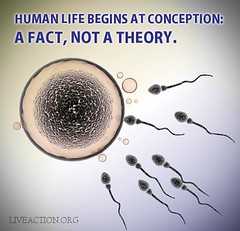Even as I type the title of my article here, I cringe at the shower of outrage that’s about to come my way. No, seriously, I know that many well-meaning people believe that it is possible to be personally pro-life. I’ve been thinking about this recently, and I have to disagree. I’m talking about the people who say, “I wouldn’t personally have an abortion, but it’s not my place to tell others what to do.” Or something like that. Let’s run through some of the ideas and thoughts behind a “personally pro-life” viewpoint.
Would it be okay with you if I made any of the following statements? (Ignore your personal thoughts on these issues. Just take the statements at face value.)
I wouldn’t personally shoot a Mexican crossing the border into the United States, but it’s not my place to tell a Texas landowner what to do.
I wouldn’t personally drink and drive, but it’s not my job to tell you what to do.
I wouldn’t personally rape anyone, but hey, it’s not my business what you do in your own private life.
I wouldn’t personally hold up a bank at gunpoint for a joke, but I’m not going to tell you what’s ok and what’s not.
I wouldn’t personally leave my kid with an abusive babysitter, but I won’t tell you what you should do with your kid.
Thoughts, anyone? Let’s just say that personally, I think those statements are full of junk. Kudos to me if I wouldn’t personally do bad things that would make me a nasty person, a murderer, or an absolutely horrible parent. Should I just pat myself on the back now?
The point in a civilized society isn’t so much what we wouldn’t personally do, though I admit that if everyone would stop personally doing bad things, we’d live in a perfect world. But guess what: that’s not gonna happen in this world, despite our best hopes. There will always be people among us who will personally choose to do wrong things. Therefore the question becomes not what we personally won’t do, but what is wrong for all of society.
I think we can all agree with the following statements:
It’s wrong to shoot an illegal immigrant.
It’s wrong to stab a gas station cashier.
It’s wrong to smother a newborn baby.
It’s wrong to run over a black child with a car.
It’s wrong to strangle an adolescent with Down Syndrome.
It’s wrong to kidnap a woman and kill her.
It’s wrong to end a man’s life because we don’t like him.
It’s wrong to poison an elderly person because we don’t want them around anymore.
Basically, it’s wrong to kill innocent human beings. It doesn’t matter who they are or what position in life they have or what race or gender they are or what environment they came from. It doesn’t matter how old or young or developed or not developed they are. It doesn’t matter if we love them or hate them. It doesn’t matter if they’re convenient or expensive or hard to deal with. All that matters is that they’re human and we do not have the right to kill them. Civilized society agrees with this.

Except. Except in the cases of the unborn humans in our midst. The only differences they have from us are 1) their environment, 2) their level of dependency, 3) their development, and 4) their size and physical appearance. Since when are those qualifiers for the right to life?
Plenty of people live in different environments – think of people in other countries, in hospitals, or on the street. We don’t have the right to kill any of them. Plenty of people have differing degrees of dependence. What about a person on a ventilator, a newborn baby, a disabled adult, or a regular five-year-old? When does someone become “too dependent” – so much so that we have the right to kill them?
Plenty of people are at different developmental stages – whether you’re talking about mental or physical development. Human life is, in a way, development. Plenty of people are different sizes with different physical appearances. Think of men, women, dwarves, giants, three-year-olds, and people born with a cleft lip. Do any of those things affect our “right” to kill them? Clearly, they don’t in any case we can think of – except the unborn. This is an illogical, unfounded, and entirely unjust exception.
The gravity of this injustice should force us to take a public stand. We cannot afford to be “personally pro-life.” While it’s great if you wouldn’t have an abortion yourself, it’s not enough. Babies are being put to death in horrific ways every single day in our nation and throughout the world. If your only opinion is that you wouldn’t have an abortion, than you’re not actually pro-life. You simply wouldn’t personally have an abortion. I congratulate you on this decision – it’s an excellent one.
But being pro-life means that you think no baby should be sentenced to die in this way. It means that you’re willing to take a stand and say, “Every life is precious, not just the life of my own child. Every baby deserves a chance to live. Every baby has the equal right to life. And I will stand up for that life.” When you can say that, my friend, then you are truly pro-life.
Editor’s Note: This article was first printed at Live Action News on October 3, 2012, and is reprinted here with permission.






I think the position these people hold is a bit different than you imagine. The comparisons would be more like:
“I wouldn’t personally spank my children, but it’s not my place to tell others what to do.”
“I wouldn’t personally act as a conscientious objector, but it’s not my place to tell others what to do.”
“I wouldn’t personally steal if I were starving, but it’s not my place to tell others what to do.”
“I wouldn’t personally spend $4000 on my dog when it could go to starving children, but it’s not my place to tell others what to do.”
Do you accept that at least some oft he above are acceptable statements?
I think there are four real differences between the way you are interpreting the personally pro-life statement and the way people actually mean it. One, or more (often all) of these apply in different situations.
1. The level of uncertainty about the issue is different from your own. A person who says this (not myself, btw) often believes that the true moral right is not known, and so, like with spanking or war or other unknowns, one should leave some options open.
2. Even when the speaker considers there are some negatives to abortion, he or she does not believe they are as strong as what you believe. I don’t know what you think is the negative end from abortion, so it is hard to give examples here, but for many people they see some negatives (maybe brief fleeting pain to an organism as complex, at different stages, as a frog…or a possible low level of regret for some parents…or a soul that has to be reimplanted in another body to be born…). whatever it is they think is the possible negative, is not what you think is the possible negative.
3. The speaker is thinking of the different conditions that may apply. He or she might not get an abortion because of a relatively stable emotional state, financial situation, health, and not being a drug addict. On the other hand this person understands that others may have different conditions.
4. It is quite likely that this person has a teleological ethical system while yours is largely deontological. This introduces another level of uncertainty, because calculating right and wrong in a teleological system is more complex.
Thanks for taking the time to comment. I understand where you’re coming from, and yes, I think many people who claim to be “personally pro-life” would view it the way you’re saying. However, men in countries who believe it’s ok to rape women would see rape in the same way. That doesn’t make them any more correct, or their views any more valid. Rape is wrong, and that’s recognized by civilized societies. Despite someone’s morals (or lack thereof) and despite the type of ethical system they subscribe to, certain things are just WRONG. Rape is one of those things. And abortion – which is scientifically and factually the intentional killing of a human being – is also one of those things.
I agree that from your perspective where abortion is wrong and always wrong, the “personally pro-life” position is a wrong position to hold. However I think it is this that you need to argue, and not that the position doesn’t exist because it clearly does. Your argument presupposes the absolute wrongness of abortion, equating it with rape, while the premise on the side of the others is often very different. You can attack the premises, but not the very existence of a position that rests on that premise. Doing so is like saying Buddhism does not exist because you don’t believe in reincarnation. Regardless of your premise regarding the premises held by Buddhists, the position regarding the universe does exist and, given its premises, may well be entirely consistent.
A more appropriate title and topic would be simple “Those who are ‘personally pro-life’ are in the moral wrong because abortion is always wrong and nothing wrong should ever be accepted”. It’s a pretty short blog, though, since that about sums up the argument.
Thanks, again, for your perspective. Yes, that one sentence would about cover it =) And I do think that’s true, but I just also think that people who claim to be personally pro-life perhaps haven’t thought it through, and the goal of my article here is to challenge some (though I’m sure it doesn’t cover all) of their perceptions, assumptions, and conclusions. Some people will be convinced one way and others another way. So this is one attempt to explain why “personally pro-life” can’t really stand up in a civilized society. =)
Yes, I can guess that there may be a few who, as you say, simply haven’t thought it through. I think they’re going to be in the minority, though. While I do think most people have holes and gaps in their thinking, for the most part, given their premises, a persons conclusions make sense…it’s just a matter of really digging down to figure out what those premises are.
Saw a sign on the back of a truck. It said,
Blacks didn’t choose slavery Jews didn’t choose genocide Babies didn’t choose abortion Everyone gets a choice but the victim